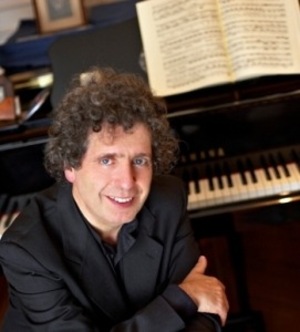CREATIVE ADVENTURES OF PIANIST M.LÉVIN IN FATHER’S HOMELAND, KAUNAS 0
Vaiva Mažulytė
www.kamane.lt , 2009 11 11
M.Lévin
It is searched for connections with relatives and close people not only in TV shows but in the cultural sphere as well. Tracing the steps of the father born in Kaunas, famous philosopher Emmanuel Levin, the pianist and composer Michaël Lévin gave a concert in the temporary capital.
There was not much information about the concert on the 10th of November. Perhaps this was the reason why the Music Hall of the National M.K.Čiurlionis Art Museum was not full. M.Lévin honoured his father’s memory and his native city quietly and without much publicity.
M.Lévin is an artist active in two fields. In such cases one starts comparing in which field the artist is more successful. This time the performer granted the possibility to do this by playing not only the works of other composers but own compositions as well.
Listeners could hear “Symphony Etudes” by R. Schumann and six preludes from the first book by C. Debussy in the first part of the concert. These works let one evaluate M.Lévin as a pianist who could not be separated from M.Lévin as a composer in fact. The main playing qualities of this artist were evidently developed with the help of his compositional achievements.
As a pianist, M.Lévin does not strive for virtuosity and does not demonstrate his technical skills. He is concentrated on the form of a music piece and seems to forget thinking about himself as a performer. He does not try to interpret a work and tries to perform it the way it is.
While playing preludes No. 1, 2, 3, 4, 6 and 7 by C.Debussy, M.Lévin seemed to be tuned as a composer – he placed various compositional details into places where they should have been without giving too much attention to the wish typical of musicians to identify themselves with the created musical view.
As M.Lévin stated himself, three etudes created by him revealed the origin and characteristics of the fortepiano as instrument. Saying this, apparently he had in mind the hammer-like structure of the fortepiano and interpreted it as a percussion instrument. The composer used a really interesting technique for receiving the sound of a drum in his three etudes; he even used the method of touching strings or covering them by hand. Even though these methods are not new in the 21st century, M.Lévin applied them in an original manner and created compositions worth attention.
At the end of the concert the guest performed the work of his friend or at least the partner on idea level, composer Tristan Murail. M.Lévin is related with T.Murail by the circle of contemporary French composers Ensemble l'Itinéraire founded in 1973, in which they concentrated on the creation of spectral music.
The composition of T.Murail “Territories of Oblivion“ (created in 1977) was interesting by the pressed right pedal of the fortepiano throughout the music piece. Due to this reason the music sounded in space constantly full of sound; and strings resonated freely. These are experiments with the pedal of T.Murail based on the thought that music is alive only on the moment the sound is heard and that a touched string silences down quickly in the fortepiano. One may remember the words pronounced by M. Lévin during the concert: “As the pedal is released at the end of “Territories of Oblivion”, the entire memory of the work is gradually erased“.
A tiny but interesting detail: even though the recital of M.Lévin was quiet in Kaunas, it cost quite a lot to the organisers. The fortepiano of Fazioli company was transported from Vilnius specifically for the concert. We will not know how the concert would have resounded if the Petrof fortepiano present in the hall were used; still, it gives plenty of food for thought.

